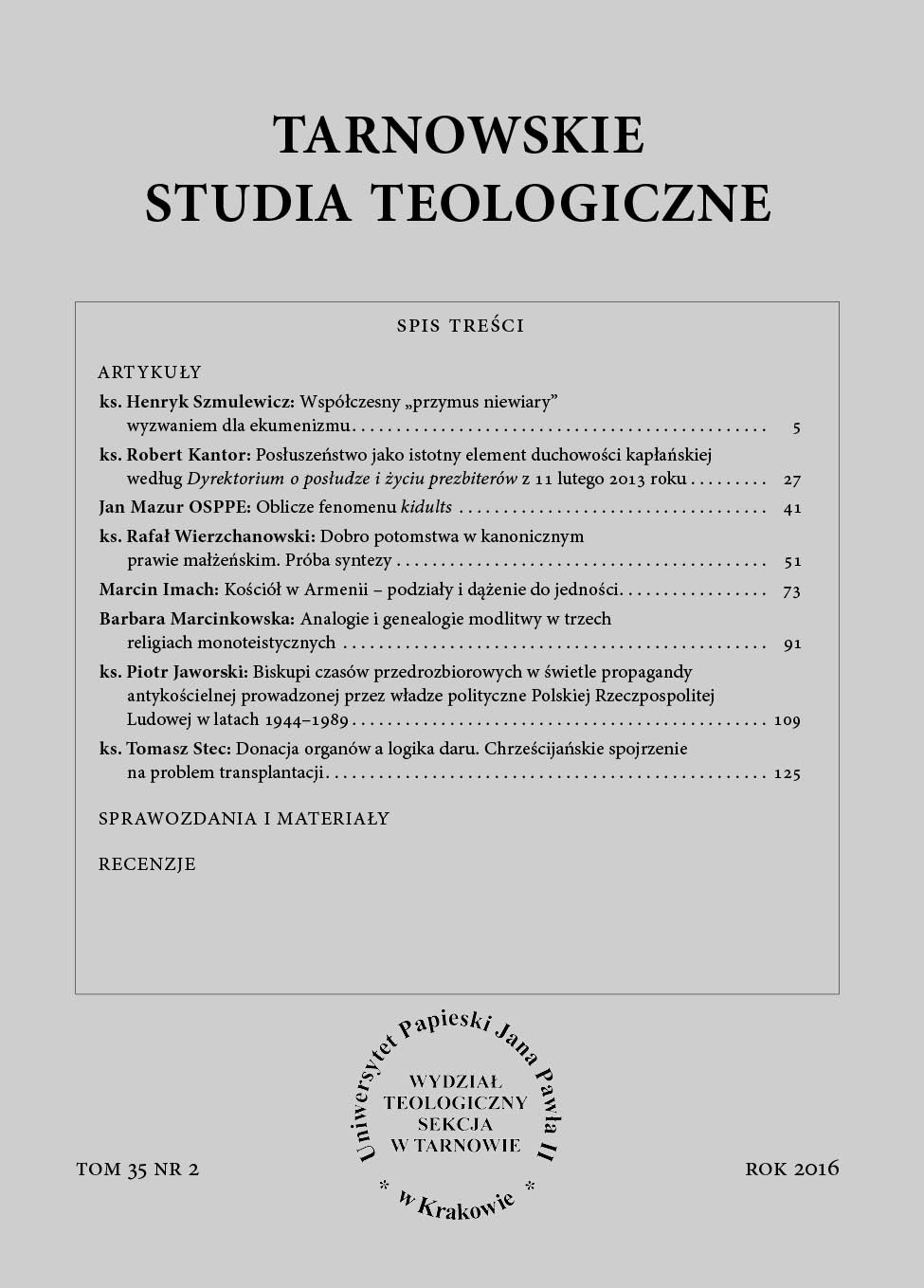Donation of organs and the logic of the gift. Christian look at the problem transplant
DOI:
https://doi.org/10.15633/tst.2109Keywords:
transplantation, organ donation, organ acquisition, the logic of the gift, organ traffickingAbstract
Transplantation today is a very important section of the entire medicine. With its prosidures more and more sick people get a chance to continue rather a normal life. The problem however, is more waiting patients for a transplant than the number of available donors. To increase the number of transplantation procedures is necessary for upbringing of a proper society. One way is to develop an attitude that could be described by the term “logic of gift.” The man as a social being, is willing to sacrifice for other people very much, even the sacrifice of himself. The attitude of the person who decides to give his organs is to be described as altruistic. For such virtues, however, you need to properly educate the people. This is the way to obtain more body organs and to prevent immoral abuses such as organ trafficking.The article discusses the problem of transplantation. It shows how the developement of the Catholic Church thought about donating organs, reveals abuses which today are present at transplantation. Promotes the “logic of gift” or attitude opposite egoistic perception of your body as an absolute property.
References
Biesaga T., Kontrowersje wokół nowej definicji śmierci, „Medycyna Praktyczna” 2 (2006), s. 20–28.
Buczyński S., Snopek P., Aspekty kryminologiczne nielegalnego obrotu narządami, tkankami oraz komórkami ludzkimi, „Hygeia Public Health” 49 (2013), s. 229–234.
Gardocka M., Problem zgody domniemanej w polskiej transplantologii, „Warszawskie Studia Teologiczne” 26 (2013) nr 1, s. 247–260.
Gervais K. G., Redefining death, New Haven 1986, http://www.mp.pl/etyka/kres_zycia/show.html?id=58520 (17.01.2016).
Hoffenberg R., Christiaan Barnard: his first transplants and their impact on concepts of death, „British Medical Journal” 12 (2001), s. 22–27.
Hołub G., O dwu sposobach pozyskiwania organów do transplantacji, „Studia Gdańskie” 25 (2009), s. 129–146.
Jan Paweł II, Encyklika Evangelium vitae.
Jan Paweł II, Podarować cząstkę siebie. Fragmenty przemówienia wygłoszonego do uczestników Kongresu Transplantologicznego, Watykan, 20.06.1996, „W Drodze” 1 (1997), s. 67.
Jan Paweł II, Poszukiwania naukowe muszą szanować godność każdej ludzkiej istoty. Przemówienie do uczestników Kongresu Światowego Towarzystwa Transplantologicznego, Rzym, 29.08.2000, http://www.opoka.org.pl/biblioteka/W/WP/jan_pawel_ii/przemowienia/transplantologia_29082000.html (12.01.2016).
Jan Paweł II, Przemówienie na I Międzynarodowym Kongresie Światowego Towarzystwa Transplantologicznego, w: W trosce o życie, red. K. Szczygieł, Tarnów 1998.
Kant I., Uzasadnienie metafizyki moralności, tłum. R. Ingarden, Warszawa 1984.
Katechizm Kościoła Katolickiego, Poznań 2002.
Kimbrell A., The human body shop: the engineering and marketing of life, San Francisco, Harper 1994.
Krajewski K., Etyka rodzinna, w: U źródeł tożsamości kultury europejskiej, red. T. Rakowski, Lublin 1998, s. 182–187.
Lanzetta M., Petruzzo P., Vitale G. i in., Human hand transplantation: what have we learned?, „Transplantation Proceedings” 36 (2004), s. 664–668.
Machinek M., Śmierć w dyspozycji człowieka: teologia moralna wobec problemów etycznych u kresu życia ludzkiego, Olsztyn 2001.
Meilaender G., Gifts of the body, „The New Atlantis” Summer 2006 nr 13, s. 25‒35.
Meyer S., Trafficking in human organs in Europe. A myth or an actual threat?, „European Journal of Crime” 14 (2006), s. 208–229.
Panjabi R., The sum of a human’s parts: global organ trafficking in the twenty-first century, „Pace Environmental Law Review” 28 (2010) No. 1, s. 1–145.
Picewicz J., Zagadnienie transplantacji w dokumentach społecznej nauki Kościoła, „Rocznik Filozoficzny Ignatianum” 1 (2015), s. 98–114.
Pius XI, Encyklika Casti connubi, http://www.opoka.org.pl/biblioteka/W/WP/pius_xi/encykliki/casti_connubi_31121930.html (10.01.2016).
„Poltransplant. Biuletyn Informacyjny” maj 2014, http://www.poltransplant.org.pl/statystyka_2015.html (12.01.2016).
Skalski J., Historia przeszczepiania narządów, „CX-News” 28 (2009) nr 2, s. 243–254.
Sobiak J., Przeszczepianie narządów i komórek krwiotwórczych – rys historyczny, „Nowiny Lekarskie” 80 (2011) nr 2, s. 157–161.
Ustawa z dnia 26 października 1995 r. o pobieraniu i przeszczepianiu komórek, tkanek i narządów (obowiązywała do dn. 1 stycznia 2006 r.), Dz.U. Nr. 138, poz. 682.
Ustawa z dnia 1 lipca 2005 r. o pobieraniu, przechowywaniu i przeszczepianiu komórek, tkanek i narządów (ogłoszona dn. 6 września 2005 r., weszła w życie dn. 1 stycznia 2006 r.), Dz.U. Nr 169, poz. 1411.
W trosce o życie, red. K. Szczygieł, Tarnów 1998.
Wałaszewski J., Stryjecka-Rowińska D., Dawcy narządów, rozpoznanie śmierci mózgowej, w: Transplantologia kliniczna, red. W. Rowiński, J. Wałaszewski, L. Pączek, Warszawa 2004, s. 35–49.
Downloads
Published
Issue
Section
License
Copyright (c) 2017 Tomasz Stec

This work is licensed under a Creative Commons Attribution 4.0 International License.
Authors who publish with this journal agree to the following terms:
- Authors retain the copyright and full publishing rights without restrictions, and grant the journal right of first publication with the work simultaneously licensed under a Creative Commons Attribution 4.0 International License that allows others to share the work with an acknowledgement of the work's authorship and initial publication in this journal.
- Authors are able to enter into separate, additional contractual arrangements for the non-exclusive distribution of the journal's published version of the work (e.g., post it to an institutional repository or publish it in a book), with an acknowledgement of its initial publication in this journal.
- Authors are permitted and encouraged to post their work online (e.g., in institutional repositories or on their website) prior to and during the submission process, as it can lead to productive exchanges, as well as earlier and greater citation of published work (See The Effect of Open Access).

